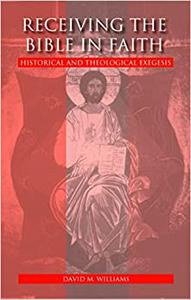
David Williams, "Receiving the Bible in Faith: Historical and Theological Exegesis"
English | 2004 | ISBN: 0813213754 | PDF | pages: 256 | 1.0 mb
There is a tension between classic and modern approaches to the Bible that continues to drive discussion today. For traditional theology, the Bible was divine revelation and a Church Father could say "we listen to God when we read." For critical history, the Bible was a collection of writings from the past to be read no differently than any other book. The weight of the tension falls on those who wish to combine the two approaches without being false to either. This book comes to the issues through sustained examination of contemporary writers committed to the faithful practice of both theology and history: biblical scholars Raymond Brown and Brevard Childs, and theologians Juan Luis Segundo and Henri de Lubac.
Drawing especially on Brown and de Lubac, David Williams concludes that faithful reception of the Bible as Scripture involves both full application of historical studies and open acceptance of a Christological focus. Separating the biblical witness from history threatens to break contact with the communities of biblical Israel and the apostolic Church, just as failing to see that "in these last days, God spoke to us through a Son" threatens to reduce the Bible to a merely historical artifact. To avoid the first difficulty, Williams argues for recognition of the Bible as a complex union of human and divine intentions where historical work is necessary to distinguish and maintain the integrity of each. To avoid the second, he sets the four traditional senses of Scripture within a Christocentric framework as a means of actualizing the textual witness in the present.
The book should prove helpful to students as an overview of some of the issues involved, while more advanced readers will appreciate its analysis of recent scholars as well the attempt to integrate and adapt their insights.
David M. Williams is Assistant Professor of Theology at Belmont Abbey College.
PRAISE FOR THE BOOK
"A significant, if not yet definitive, step in the much-needed integration of traditional exegetical approaches and the use of historical disciplines. . . . The number of books dealing with exegesis and trying to move beyond the impasse created by the historical critical vs. traditional debate are numerous. This book challenges some strongly held opinions on both sides but does so in a way that points to a possible integration."―Francis Martin, John Paul II Cultural Center
"This is a thoughtful and thought-provoking treatment of a growing controversy among contemporary Catholic (and Christian) exegetes and theologians. Williams makes practical suggestions that help to make sense of Scripture both for modern historical consciousness and for faith concerns and the Catholic tradition of interpretation. His research is careful, his writing is balanced, his critiques are sharp but fair, and his overall tone is one of quietly searching for the truth with respect for all who have done so before him. Scholars interested in the relationship between historical and theological exegesis will have to consult this considered opinion."―William S. Kurz, S.J., Professor of New Testament, Marquette University
"Williams' own book is well worth a read. The issues with which he struggles are critical if we are to move forward valuing the particularities of history, including the specificities of Jesus of Nazareth and our own contexts, as well as the faith that convinces us that the Bible is unique, revelatory and very revelant."- Alice L. Laffey, Catholic Books Review
Links are Interchangeable - No Password - Single Extraction



